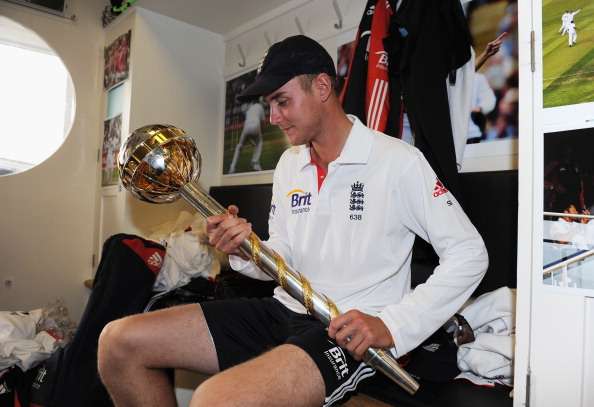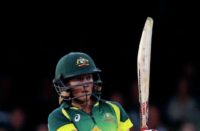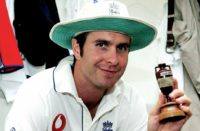Chris Stocks finds that Stuart Broad is grateful to be playing in more enlightened times for England nowadays
The Nineties was a decade of change, with Eastern Europe shedding the straightjacket of communism, Labour sweeping to power in the UK for the first time in two decades and the ‘Cool Britannia’ cultural renaissance led by artists like Damien Hirst and bands such as Oasis and Blur.
The Nineties was a time of great change in English cricket, too – although not always for the best. This was an era where players were chopped and changed at will, backing afforded to current England stars was almost non-existent for a band of cricketers whose potential remained unfulfilled thanks partly to a system that failed them.
Mark Ramprakash, Devon Malcolm and Dominic Cork are but three players whose Test careers may have been very different had they been born 20 years later.
With the advent of central contracts in 2000, things have changed for the better for England, with consistency of selection followed by a consistency of results that would have been unthinkable back in the Nineties.
There’s even been Ashes series wins – five in the past 11 years following an 18-year run of failure against Australia.
For Stuart Broad, who has benefitted more than most from the system now in place, the Nineties seems like another world and, after watching the recent Sky Sports documentary on the decade, he counts himself fortunate to be playing in an era when English cricket is much more stable and professional.
“I thoroughly enjoyed that programme,” said Broad, whose father Chris played 25 Tests as a batsman for England during the Eighties. “Whenever you play for England you are very proud to have played in any era for any team, but it made me pretty thankful that I am playing in the era I am playing in.
“We have been backed as players – we have been given opportunities, we are allowed to have two or three bad games and you get another go. Jimmy [Anderson] and I certainly wouldn’t have had the success we’ve had if we hadn’t been backed much better than some of those players in the Nineties.”
Broad and Anderson currently sit third and first in the Test rankings for bowlers, the former being usurped by the latter’s man-of-the-match display during England’s second Test win against Sri Lanka at Durham.
So, how does Broad, who in nine years playing for England has 343 wickets in 93 Tests, think he would have fared in the Nineties?
“I would be five miles an hour slower!” he said. “We all know I have these streaks of taking wickets and then I might have a couple of quiet Test matches.
“I think back in the Nineties or Eighties I’d have been straight back to my county after my quiet Test matches. It took me nine or 10 Test matches to get my first five-for.
“I certainly got a lot of backing at the start of my career, which in eras gone by I probably wouldn’t have done. I am fortunate that throughout my quiet times I have been backed – they’ve continued to give me a go.
“I think the coaches have always trusted that I know my own game – I recall Devon Malcolm getting told to change his action after getting a nine-for. I think coaches have become more adaptable and more trusting of their players.
“My injury record has been pretty good – I think I have played 40-odd Test matches on the bounce – that would have been impossible in the Eighties and Nineties because you used to finish on a Monday and you would have to play on a Tuesday or the Wednesday for your county.
“We have been looked after and saved our important overs for Test matches. Rightly or wrongly for the counties, it’s worked for England.”
The introduction of central contracts in 2000 also came at a time when England had their first overseas coach in Zimbabwean Duncan Fletcher, who alongside captain Nasser Hussain started a revival in the team’s fortunes that continues to this day.
There have been peaks and troughs over the past 16 years, including two Ashes whitewashes.
But the general trend has been improvement and under Australian Trevor Bayliss, England’s latest foreign coach, performances have improved markedly across all formats since he took charge a year ago.
“There has been a difference with him getting his feet under the table,” Broad said of Bayliss. “He came in quite unlike a lot of coaches I’ve worked under, he just sat back a little bit and wanted to see how the players operated, see how the staff operated.
“He has started to instill a bit more of his beliefs on the team. You know him, he’s not a loud person, he doesn’t speak every morning, the players run the team. All he wants is a positive mentality from the players. It’s quite an Australian way, isn’t it? But if you’re under pressure as a team, go the other way and counterpunch, don’t just try and absorb it – that’s taking a bit of learning from the team.
“There have been times when we’ve lost four or five wickets and it’s crying out for someone just to stay and get stuck in. That’s a learning curve that the team is on and he’s learning.
“We’re starting to get a balance to the team where the natural players can really go and play their game.
“He’s starting to ramp up his fielding on the team, as well. He’s seen improvements that we can make and that’s something we need to take to the next step. We have dropped catches and you do get more chances in England. But seven Tests in the Sub-continent, you’ve got to take your chances, because it will be hard work.”
Those seven Tests this winter will comprise two in Bangladesh and five in India during arduous back-to-back tours before Christmas.
They will be a severe Test of England’s aspirations to become the world’s No.1 Test team, assuming this summer they follow up their series win against Sri Lanka with another against Pakistan.
Broad, though, is confident England are heading in the right direction. “I don’t want to look too far ahead and this winter’s tough,” he said. “The team’s got a lot of bases covered.
“But the consistency in the batting is something we need to address.
“When we got to No.1 [in 2011] when I was there, we got 400 pretty much every first innings. When you had a line-up of [Andrew] Strauss, Cook, [Jonathan] Trott, Kev [Pietersen], Colly [Paul Collingwood], [Ian] Bell, [Matt] Prior averaging 45 at seven. It was very, very strong.
“And that’s something we’re aware of, we need to get more consistent with that, we can certainly score more runs with the tail. But it’s exciting because we know there are little pods where we know we are near to fulfilling our potential, but we’re still winning games, still winning some mega series.
“So once we get a few more matches under our belt with the experience of having been places before, that’s where we take it to the next level.”
It all seems a long way away from the Nineties, the decade when taking things to the next level often meant winning a dead rubber Test at the end of yet another unsuccessful Ashes series.
Investec is the title sponsor of Test match cricket in England. For more on Investec private banking, visit investec.co.uk/banking
This piece originally featured in The Cricket Paper, Friday June 10 2016
Subscribe to the digital edition of The Cricket Paper here















